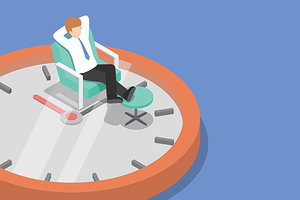If you ask 10 patients what they do to care for themselves, most will answer with a list of excuses as to why they don't do anything or don't do as much as they should.
The Consequences of Self-Neglect
A few of the obstacles experts identify as standing in the way of self-care are a lack of energy, too many responsibilities, and the fear of appearing weak or vulnerable. Another common hurdle for practitioners is the challenge in putting themselves first; the inability to acknowledge that their needs deserve to be made a priority.
The cost of that self-neglect is high and ranges from nagging stress that can erode health and well-being; to compassion fatigue so crippling you may eventually walk away from your chosen profession.
Many practitioners are also business owners. We get wrapped up in the idea that we have to work all of the time and will take care of ourselves when we "need it." Unfortunately, in many cases, by the time we "need it," we've probably pushed it too far.
 "Failure to take care of yourself along the way can result in ongoing stress, which may seep into your personal life and may diminish the satisfactions you derive from work and your ability to be fully present with your clients," says Lisa Butler, PhD, associate professor, University of Buffalo School of Social Work.1 Think Maslow's Hierarchy of Needs: physiological, safety and security, love and belonging, esteem, self-actualization. Basic human function is self-care.
"Failure to take care of yourself along the way can result in ongoing stress, which may seep into your personal life and may diminish the satisfactions you derive from work and your ability to be fully present with your clients," says Lisa Butler, PhD, associate professor, University of Buffalo School of Social Work.1 Think Maslow's Hierarchy of Needs: physiological, safety and security, love and belonging, esteem, self-actualization. Basic human function is self-care.
5 Easy Ways to Care for Yourself
1. Take time to eat real food – nourish your body. How many practitioners skip lunch, grab something on the go or eat in front of their computer? (Guilty !) For us, even drinking an adequate amount of water can be a daily struggle. Energize your body with a quality multivitamin formulated without fillers; support your natural detoxing ability with milk thistle/silymarin, vitamin E, vitamin D and CoQ10; and know your food / chemical sensitivities. These constant immune triggers can wear your system down right before your eyes. Your physiological needs should be met first.
2. Secure your finances. Meet with a financial planner and know what you're up against. Many people fear dealing with money. Constant worry or stress can wear the body down. (A combination of rhodiola, magnolia, philodendron, phosphatidylcholine, and MCTs can help support the adrenals and reduce stress.) Meeting with a financial expert can help you come up with a reasonable plan and get you on track. Stressing about finances is not helpful for your health and well-being.
3. Spend time with your family. Love and belonging are the third level of human needs. If we are the sum of the five people we spend the most time with, get out and mingle! A walk outside for exercise and sun therapy can do the body (and mind) wonders. Know your vitamin D level. According to Dr. Russ Jaffe, "40% of the population [cannot] convert vitamin D from their time in the sun." Plan a hiking trip with friends or a backyard gathering with family. Do what brings you joy!
4. Spend time meditating every day. We are usually good for one solid session, but strive to achieve two each day. An l-methionine and magnesium combination can help calm the monkey brain for more relaxed meditation and sleep. Mediation or prayer time can help reduce stress, lower blood pressure, and create clarity. Trust your strengths and ability to work through your challenges.
5. Exercise living your own truth. "What a man can be, he must be."2 Say yes when you mean yes and no when you mean no. Reduce intake of animal protein, support your microbiome, and consider adding sulfur-building foods such as eggs, onions, broccoli, garlic and ginger. Create a daily routine that supports your goals, not a habit of navigating the landmines of others' agendas.
Let Yourself Matter
What's included in the safety instruction before every flight? Put your own mask on before you help someone else – you can't help anyone else if you go down. In EMT class, you are always taught to clear the scene and make sure you have your own personal protective gear on before you render aid – again, take care of yourself first. Make sure you are in a place that allows you to provide the best care possible to those who come to you for help.
By the way: When was the last time you received an adjustment from a colleague – just for your own benefit? It's not selfish – it's common sense.
References
- Jackson K. "Social Worker Self-Care - The Overlooked Core Competency." Social Work Today, May / June 2014;14(3):14.
- Quote from Abraham Maslow, American psychologist (1908-1970).
Click here for more information about Douglas R. Briggs, DC, Dipl. Ac. (IAMA), DAAPM, EMT.
Melissa Crispell is a certified nutrition specialist, certified wellness coach, certified natural healthcare practitioner, friend of First State Health & Wellness and nationally-recognized speaker.





